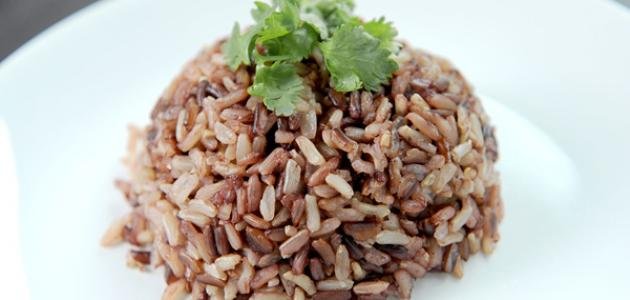
Brown rice Brown rice is a kind of rice, which is the whole rice, which is treated by eliminating the non-edible crust. It is grown in many areas. It needs warm weather, high moisture, and constant water to grow with the right and right road. The Arab Republic of Egypt is one of the most famous Arab countries in the cultivation of brown rice; it exports it to most regions of the world, and has several types, including short grain and long grain, and the medium grain in length. Some brown rice is called brown rice and is more useful than white rice, and it is easy to cook. Brown rice is an important source of calcium at a rate of 40%, which is important for bone health, is useful in blood clotting, regulates heartbeat and deficiency. It causes nerve irritation. It contains 55% phosphorus, which works on bone stiffness when combined. With calcium. Brown rice contains iron important in maintaining body tissues, potassium that supplies the body with energy, fiber that works to reduce cholesterol levels in blood and limit constipation, as well as contain vitamin B1 and vitamin B2; they are very useful for the body. Benefits of brown rice for slimming Many studies point to the importance of brown rice. Nutritionists and specialists recommend replacing white rice with white rice through diets and dieting systems to obtain proper weight and loss of some kilograms. The brown rice helps in weight loss because it contains minerals and fiber at a high rate. Fiber helps to feel full, which reduces the volume of food, as well as it helps metabolism, and brown rice has a low glycemic index does not cause the sharp rise in sugar Plays a role in storing fat inside the body. The difference between brown rice and white rice The brown rice is composed of the outer crust and is treated and removed from the outer shell. The remnants of the crust, the endoserm and the embryo are roasted, while the white rice is processed and left with remnants of the crust and the starchy endoserma. Brown rice preserves the fibers in it and contains acids and vitamins. It is very rich in manganese, which saves the body from the harmful free radicals that are produced by energy production. In addition, the oil in its skin reduces the cholesterol and retains its nutritional value. It leaves only the remnants of the crust and the starchy endoserm, meaning that it loses most nutrients, vitamins, minerals and fibers in the cortex and embryo; that is, it resembles the shadow of a grain of rice, and its nutritional value decreases and becomes a source of starch only.
You got a 85.25% upvote from @emperorofnaps courtesy of @ferialabashir!
Want to promote your posts too? Send 0.05+ SBD or STEEM to @emperorofnaps to receive a share of a full upvote every 2.4 hours...Then go relax and take a nap!